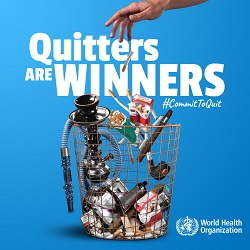World No Tobacco Day 2021: Commit to Quit

31 May 2021
WHO has recently launched a year-long global campaign for World No Tobacco Day 2021 – “Commit to Quit”. This campaign aims to support 100 million people worldwide in their attempt to give up tobacco through various initiatives and digital solutions. It will help create healthier environments that are conducive to quitting tobacco by:
- advocating for strong tobacco cessation policies
- promoting increased access to cessation services
- raising awareness of tobacco industry tactics
- empowering tobacco users to make successful attempts to quit through “quit & win” initiatives.
The COVID-19 pandemic has led to millions of tobacco users wanting to quit. However, quitting tobacco is challenging, especially with the added social and economic stresses brought about by the pandemic.
Worldwide, around 780 million people say they want to quit, but only 30% of them have access to the tools that can help them to overcome both physical and mental addictions to tobacco. Together with partners, WHO will provide people with the tools and resources they need to make a successful attempt at quitting.
Quitting tobacco has major and immediate health benefits
There are immediate and long-term health benefits to quitting tobacco. After just 20 minutes of quitting smoking, the heart rate drops. Within 12 hours, the carbon monoxide level in the blood drops to normal. Within 2–12 weeks, the circulation improves and lung function increases. Within 1–9 months, coughing and shortness of breath decrease. Within 5–15 years, the stroke risk is reduced to that of a non-smoker. Within 10 years, the lung cancer death rate is about half that of a smoker. Within 15 years, the risk of heart disease is that of a non-smoker.
Policies and capacity for tobacco cessation in WHO European Region must improve
Cessation policies are still among the least implemented of all WHO Framework Convention on Tobacco Control demand reduction measures, with only 8 countries providing best-practice cessation services in the European Region, the majority of which are high-income countries.
Governments should recognize this unmet need and act on it as part of a comprehensive tobacco control strategy. Population-level, cost-effective tobacco cessation interventions must be a priority for countries. At the same time, innovation is to be encouraged and mobile technologies should be fully harnessed to improve access to large and hard-to-reach populations.
Digital solutions to help the world’s 1.3 billion tobacco users to quit
WHO set up the new Access Initiative for Quitting Tobacco, which gives people, among other things, free access to digital counselling. WHO has partnered with tech companies like Facebook, WhatsApp and Soul Machines to raise awareness and support tobacco users to quit with the help of chatbots and digital health workers. For instance, Florence, a digital counsellor, based on artificial intelligence, helps people develop a personalized plan to quit tobacco and guides them to available mobile apps and toll-free quit lines in their countries. Meanwhile, the Quit Challenge on WhatsApp provides signed-up tobacco users with free messages on how to quit, directly to their mobile phones.
These and other global and regional cessation tools will be rolled out as part of the campaign for World No Tobacco Day 2021, which will reiterate once again that strong cessation services improve health, save lives and save money.



